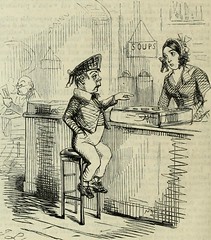Anglų - Lietuvių žodynas
Kompiuterinis žodynas internete nemokamai
pay
Pay tarimas:
/pei/
Pay audio:
Žodžio paaiškinimas anglų kalba:
- verb-transitive: To give money to in return for goods or services rendered: pay the cashier.
- verb-transitive: To give (money) in exchange for goods or services: paid four dollars for a hamburger; paid an hourly wage.
- verb-transitive: To discharge or settle (a debt or obligation): paying taxes; paid the bill.
- verb-transitive: To give recompense for; requite: a kindness that cannot be paid back.
- verb-transitive: To give recompense to; reward or punish: I'll pay him back for his insults.
- verb-transitive: To bear (a cost or penalty, for example) in recompense: She paid the price for her unpopular opinions.
- verb-transitive: To yield as a return: a savings plan that paid six percent interest.
- verb-transitive: To afford an advantage to; profit: It paid us to be generous.
- verb-transitive: To give or bestow: paying compliments; paying attention.
- verb-transitive: To make (a visit or call).
- verb-transitive: To let out (a line or cable) by slackening.
- verb-intransitive: To give money in exchange for goods or services.
- verb-intransitive: To discharge a debt or obligation.
- verb-intransitive: To bear a cost or penalty in recompense: You'll pay for this mischief!
- verb-intransitive: To be profitable or worthwhile: It doesn't pay to get angry.
- adjective: Of, relating to, giving, or receiving payments.
- adjective: Requiring payment to use or operate: a pay toilet.
- adjective: Yielding valuable metal in mining: a pay streak.
- noun: The act of paying or state of being paid.
- noun: Money given in return for work done; salary; wages.
- noun: Recompense or reward: Your thanks are pay enough.
- noun: Retribution or punishment.
- noun: Paid employment: the workers in our pay.
- noun: A person considered with regard to his or her credit or reliability in discharging debts.
- phrasal-verb: pay off To pay the full amount on (a debt).
- phrasal-verb: pay off To effect profit: a bet that paid off poorly.
- phrasal-verb: pay off To get revenge for or on; requite.
- phrasal-verb: pay off To pay the wages due to (an employee) upon discharge.
- phrasal-verb: pay off Informal To bribe.
- phrasal-verb: pay off Nautical To turn or cause to turn (a vessel) to leeward.
- phrasal-verb: pay out To give (money) out; spend.
- phrasal-verb: pay out To let out (a line or rope) by slackening.
- phrasal-verb: pay up To give over the full monetary amount demanded.
- idiom: pay (one's) dues To earn a given right or position through hard work, long-term experience, or suffering: She paid her dues in small-town theaters before being cast in a Broadway play.
- idiom: pay (one's) way To contribute one's own share; pay for oneself.
- idiom: pay the piper To bear the consequences of something.
- idiom: pay through the nose Informal To pay excessively.
- verb-transitive: To coat or cover (seams of a ship, for example) with waterproof material such as tar or asphalt.
Lietuviškos reikšmės:
- atlyginimas
- alga
- full pay pilnas (tarifinis) atlygis
- half pay pusė (tarifinio) atlygio
- pašalpa
- išmokėti
- atmokėti
- apmokėti
- suteikti garbę
- (už)mokestis
- v (paid)
- mokėti
- strike paypašalpa
- profsąjungos mokama streikuojantiems
pay
www.alkonas.lt/zodzio/pay/vertimas
not pay
www.alkonas.lt/zodzio/not-pay/vertimas
pay for
www.alkonas.lt/zodzio/pay-for/vertimas
pay off
www.alkonas.lt/zodzio/pay-off/vertimas
pay out
www.alkonas.lt/zodzio/pay-out/vertimas
pay up
www.alkonas.lt/zodzio/pay-up/vertimas
Ability to pay
www.alkonas.lt/zodzio/ability-to-pay/vertimas
Anomaliess pay
www.alkonas.lt/zodzio/anomaliess-pay/vertimas
back-pay
www.alkonas.lt/zodzio/back-pay/vertimas
bat-pay
www.alkonas.lt/zodzio/bat-pay/vertimas
Žodyno testas
Ką reiškia lietuviškai?
Parinkite teisingą atsakymą
abomination
/ə,bɔmi'neiʃn/

